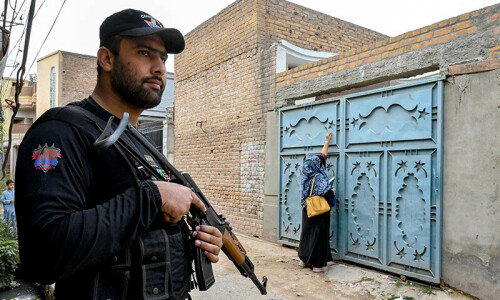Pakistan’s fight to eradicate polio is being hampered by violent attacks and misinformation-based suspicion, but teams of dedicated volunteer health workers are determined to continue.
The only countries where the crippling virus remains endemic are Pakistan and Afghanistan. The disease mostly affects children under the age of five and can sometimes cause paralysis that lasts a lifetime.
This year, 45 cases have been reported in Pakistan, up from six in 2023 and just one in 2021.
Although a few drops of vaccine administered orally can easily prevent polio, health workers in rural Pakistan risk their lives to save others.
A bomb aimed at police officers traveling to protect vaccine workers last week killed seven people, including five children. Two police escorts had been shot to death by militants a few days earlier.
As she went door to door in Panam Dehri in Khyber Pakhtunkhwa, health worker Zainab Sultan, 28, said, “When we hear that a polio vaccination team has been attacked, it deeply saddens us.”
The task at hand is to carry on with our work. Our responsibility is to prevent disability, vaccinate children, and cultivate healthy members of society.
False claims In the past, outspoken religious leaders falsely claimed that the vaccine contained alcohol or pork, which Muslims were forbidden to consume.
Mistrust was exacerbated by the US Central Intelligence Agency (CIA)’s 2011 fake vaccination campaign in Pakistan to locate Osama bin Laden.
In recent times, militant groups have shifted their campaigns of violence against the state to target armed police escorts.
Since the Taliban’s return to Afghanistan in 2021, Pakistan has seen a dramatic increase in attacks, with Islamabad claiming that hostile groups are now operating from there.
During a door-to-door poliovirus vaccination campaign for children on the outskirts of Peshawar, this photograph, taken on October 29, shows an elite police officer (L) standing guard while a health worker numbers houses. According to one-named local resident Ehsanullah, “in our area, nearly half of the parents were initially resistant to the polio vaccine, believing it to be a ploy by the West,”
He stated, “There was a lack of awareness.” We are harming not only ourselves but the community as a whole if we permit this disease to spread.
Rumors dispelled Some religious leaders, who previously were blamed for parents’ mistrust of polio vaccines, are now at the forefront of the campaign to persuade parents.
According to Imam Tayyab Qureshi, “all major religious schools and scholars in Pakistan have debunked the rumors surrounding the polio vaccine.”
In the provincial capital of Peshawar, where Panam Dehri is located on the outskirts, he stated, “Those who attack polio vaccination teams have no connection to Islam or humanity.”
In Panam Dehri, the support of religious leaders was crucial for one parent.
At first, I did not give my children the polio vaccine. I refused, despite everyone’s efforts,” Zulfiqar, 40, who only goes by one name, stated.
He continued, “Later, the Imam of our mosque came to explain the importance of the polio vaccine and told me that he personally vaccinated his own children and encouraged me to do the same.” I eventually agreed.
Parents in economically disadvantaged areas may also use the government’s eagerness to promote vaccination as a bargaining chip when attempting to negotiate investments in road and water projects.
Ayesha Raza, a representative for the government’s polio eradication campaign, lamented, “There are demand-based boycotts and community boycotts that we face.”
She implores them, “Your demands may be very justified, but don’t link it to the health of your children.”
Personal struggle For some medical professionals, the struggle to end polio is more personal.
Ismail Shah’s paralyzed leg does not stop him from going door to door in Panam Dehri.
The 35-year-old stated, “I decided in my childhood that when I grew up I would fight against the disease that disabled me.”



